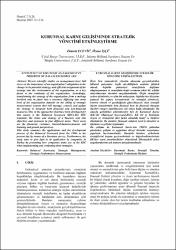| dc.contributor.author | Ecevit, Zümrüt | |
| dc.contributor.author | İşçi Güneri, Öznur | |
| dc.date.accessioned | 2020-11-20T17:50:29Z | |
| dc.date.available | 2020-11-20T17:50:29Z | |
| dc.date.issued | 2007 | |
| dc.identifier.issn | 1300-0845 | |
| dc.identifier.issn | 1300-0845 | |
| dc.identifier.uri | https://app.trdizin.gov.tr//makale/TmpnNU1qSXk | |
| dc.identifier.uri | https://hdl.handle.net/20.500.12809/8525 | |
| dc.description.abstract | Son zamanlarda yönetim alanında gerçekleştirilen bilimsel çalışmalar örgüt sürekliliğinin anahtar faktörü olarak, örgütün potansiyel stratejisinin değişime adaptasyonunu ve stratejinin örgüt ortamına etkin bir şekilde aktarılmasının önemini vurgulamaktadır. Örgüt stratejisini sadece planlarda yer alan bir anlayıştan, örgütün her düzeyine yayacak bir yapıya kavuşturmak ise stratejiyi yönetecek, kontrol edecek ve gerektiğinde güncelleyecek olan stratejik ölçüm sistemlerinin hem finansal hem de finansal olmayan ölçüleri entegre edebilmesine sıkı sıkıya bağlı olmaktadır. Bu amaçla geliştirilen yöntemlerden biri de Kurumsal Karne (KK)’dir (Balanced Scorecard-BSC). KK bir iş biriminin vizyon ve stratejisini dört farklı alandaki hedef ve ölçülere dönüştürür. Bu alanlar; finansal, müşteri, içsel iş süreçleri ve öğrenme ve gelişme boyutudur. Bu çalışma ile Kurumsal Karne’nin 1990’lı yıllardan günümüze gelişim ve uygulama düzeyi literatür araştırması yapılarak incelenmektedir. Bununla beraber, şirketlerin stratejilerini hayata geçirmelerinde ve değerlendirmelerinde KK’den nasıl yararlandıkları aktarılarak ülkemizdeki şirket uygulamalarına ışık tutması amaçlanmaktadır. | en_US |
| dc.description.abstract | Recent scientific studies on management have laid stress on the importance of an organization& #8217; s adaptation to the change in its potential strategy, and efficient assignment of the strategy into the environment of the organization, as a key factor to the continuity of the organization. Accordingly, transforming the strategy of the organization from a makeup involved only in plans into a structure diffusing into every level of the organization depends on the ability of strategic measurement systems that will manage, control, and update the strategy to integrate both financial and non-financial measures. One of the approaches that have been developed for that reason is the Balanced Scorecard (BSC).The BSC translates the vision and strategy of a business unit into objectives and measures in four different areas. These areas are the financial, customer, internal-business-process and learning and growth perspectives. This study examines the applications and the development process of the Balanced Scorecard from the 1990s to the present day by means of a literature survey. Furthermore, the study aims to give light to its application by companies in Turkey by presenting how companies make use of the BSC when implementing and evaluating their strategies. | en_US |
| dc.item-language.iso | tur | en_US |
| dc.item-rights | info:eu-repo/semantics/openAccess | en_US |
| dc.title | Kurumsal Karne Gelişiminde Stratejik Yönetimi Etkinleştirme | en_US |
| dc.item-title.alternative | Efficiency of Strategic Management in Progress of Balanced Scorecard | en_US |
| dc.item-type | article | en_US |
| dc.contributor.department | MÜ, Fen Fakültesi, İstatistik Bölümü | en_US |
| dc.contributor.institutionauthor | İşçi Güneri, Öznur | |
| dc.identifier.volume | 7 | en_US |
| dc.identifier.issue | 28 | en_US |
| dc.identifier.startpage | 121 | en_US |
| dc.identifier.endpage | 134 | en_US |
| dc.relation.journal | ÖNERİ | en_US |
| dc.relation.publicationcategory | Makale - Ulusal Hakemli Dergi - Kurum Öğretim Eleman | en_US |


















